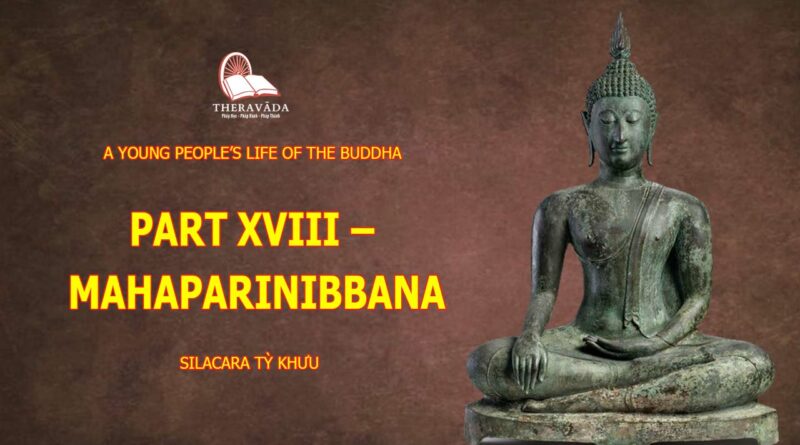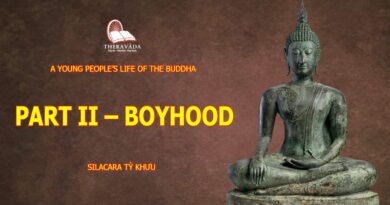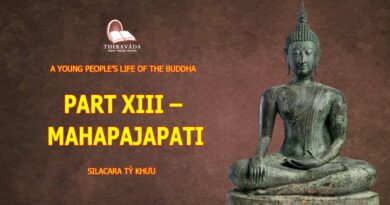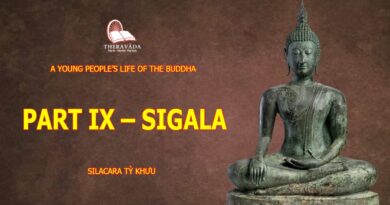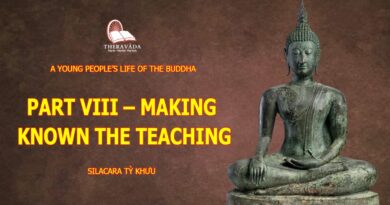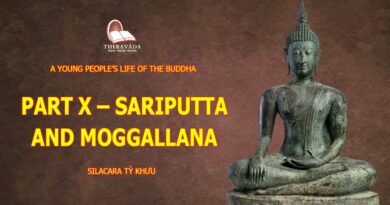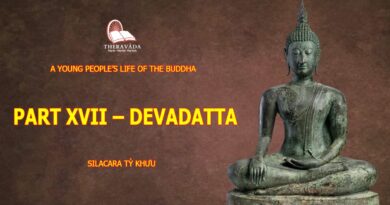A YOUNG PEOPLE’S LIFE OF THE BUDDHA: PART XVIII – MAHAPARINIBBANA
The Lord Buddha now began to feel that His days in this world were coming to a close; but before He passed away He wished to give His Bhikkhus some last advice which should serve to guide them in their general conduct after He was gone and could advise and guide them no more with His living voice. So He told Ananda to gather the Bhikkhus together in the Preaching Hall at Rajagaha; and when all the Bhikkhus had assembled, He addressed them as follows:
“O Bhikkhus, as long as you remain united and meet together frequently, so long the Sangha will continue to flourish and prosper. So long as you meet together and decide all important questions in union and harmony one with another, and do not make new and oppressive rules, hard to keep, where I have made none, but strictly adhere to the observance of those rules which I have given you for your help and protection — so long as you do this, the Sangha will never decay and die out.
“Always treat with respect those who have been longer in the Sangha than yourselves, and pay attention to their counsel and admonition. Be ever on the watch against the beginnings of anything that tends to evil in order that you may not become the slaves of evil before you are aware. Do not seek company: seek solitude. When Bhikkhus from other places come to visit you, attend to their wants and treat them well and hospitably. When any among you are sick, let the others wait upon them and care for them. He who thus waits upon and cares for a sick brother, it is the same as if he waited upon and cared for me. Shun pride vain show. Seek the companionship of the good; avoid the company of the bad. Think and reflect frequently upon the nature of all things here, that they do not last, that they cause suffering to him who clings closely to them, that they are empty of any solid substance.”
“So long as you do these things and follow the rules of conduct I have given you for your guidance, you will always be respected and esteemed by the householders and everyone, and the Sangha will prosper, and you will be safe from falling into anything low and vulgar and ignoble, you will be shielded from everything unbecoming, everything unworthy of those who have left the household life to live in homelessness.”
This was the last sermon the Buddha preached to the whole Sangha.
After this, He went to the city of Nalanda, and then to the city of Patali; and at this latter place He preached this His last sermon to the householder folk.
“Dayakas, whoever breaks the precepts of right conduct which I have taught for the guidance of householders, or is careless and slack in his observance of them, such a person will lose his good name among men, and his well-being and happiness in this world will grow less and less, and finally dwindle away and disappear altogether. He will have no certainty, he will feel no confidence of mind, but, wretched and unhappy, at death he will pass away to a fate of misery and suffering.
“But those who faithfully keep these precepts of good conduct which I have laid down, those who are not careless in the observance of them, such persons will gain honor and enjoy a high reputation among men. They will enjoy health and wealth and all prosperity. They will be welcomed wherever they may go. They will be received with pleasure even in the company of the great, among princes and king’s counselors, among the good and the learned and the wise. Their minds will be free from any kind of doubt or anxiety; and after death they will pass to a state of happiness.”
And now the Buddha is getting to be an old man. He is eighty years of age. For nearly forty-five years He has been traveling about on foot up and down His native land of India, teaching and preaching without any rest except during the rainy season of each year. And now He is feeling His years. He is weary and worn out in body, though His mind remains as strong as ever. He feels that He is not going to live much longer, and His thoughts turn to the north, towards the lands that lie at the foot of the great snowy mountains, where His youthful days were passed. It is in that country that He wishes to pass away from the world He has served so ungrudgingly these many years. So, leaving Rajagaha. He turns His now feeble steps northwards, intending to go to the little town of Kusinara, and there await death. On the way to it, He passes through the city that is now called Patna, and then, still going north, through the rich town of Vesali where He once was splendidly entertained by the courtesan Ambapali, and given a Vihara by her, much to the annoyance of the young princes of the place who wanted to have the honor of doing this themselves.
When He had arrived at the little village of Beluva, He sent away all the Bhikkhus who had been coming with Him so far, all except his faithful attendant Ananda, who never left Him night or day, telling the other Bhikkhus that they had better spend the Vassa or rainy season at some place where they would have a better chance of getting support than a little place like Beluva which could not provide food for so many of them. So most of the Bhikkhus went back to Vesali to spend the rainy season near that large and rich city.
Meanwhile, the Buddha resolved to spend this last Vassa of His life at Beluva. But He had not been staying there very long when He was seized with severe illness accompanied by violent pain. And the sickness increased and the pain grew worse until Ananda began to think that his Master was going to die. But the Buddha did not want to die at Beluva. He did not want to die until He had seen His Bhikkhus once more and encouraged them and strengthened them in the good life they are trying to live. So, with a great effort of will, He managed to master His sickness, being determined to live and see and speak to His Bhikkhus once more before He passed away. And after a time, feeling better again, He went outside and took a seat on the shady side of the little house He was living in, out of the hot sun, on a mat Ananda had made ready for Him. And Ananda sat down near Him and said:
“How glad I am to see that the Blessed One is better again! I almost fainted away when I saw how ill the Blessed One was a little while ago. I very nearly swooned. But then I thought: ‘No, most surely the Blessed One will not pass away to Nibbana till He has left full instructions about the future of the Sangha, and how it is to be conducted when He is gone.'”
“But Ananda,” said the Buddha, “what more can the Bhikkhus ask of me? I have taught them the whole doctrine; I have not hidden from them anything they ought to know in order to be able to reach Nibbana. I have been a faithful teacher to them, and told them all they need to know so that they may bring suffering to an end. One who wanted to rule the Sangha and keep it under his own control, might well leave orders about its future government. But I, Ananda, do not wish to rule over the Sangha, or to keep it under My control. What instructions then, should I leave about its future? I am now an old man, feeble and worn out. My days are at an end. I am eighty years of age. I have only one thing I want to say to you all. Be to yourselves your own light. Be to yourselves your own refuge. Do not go looking for any other light or refuge. Whoever, Ananda, when I am gone shall be to himself his own light, his own refuge, looking for no other light or refuge — whosoever shall take the truth I have taught as his light and his refuge — that disciple, Ananda, now and always will be my true disciple, will be walking in the right way.”
Next morning the Buddha was feeling so well again that He was able to go into Vesali on His usual begging round; and in the evening He sent Ananda to bring the Bhikkhus who were living in Vesali to Him, so that He might speak to them all once more.
When the Bhikkhus had all come, He exhorted them earnestly, as His last parting admonition to them, to follow faithfully the good way He had taught them, for the sake of the world, for the sake of the benefit, the advantage, the welfare of the world of men which need to have kept before it the example of the holy life, perfect and pure. “All that belongs to this world is changeable and unlasting,” He said. “Exert yourselves! Strive earnestly! Follow the Good Way! Keep close watch over your minds! So shall you find certain deliverance from the round of birth and death and all things evil.”
Then, the next morning, the Buddha started out direct for Kusinara, and on the way, at a little village called Pava, He was invited by the son of the village goldsmith, whose name was Cunda, to partake of a meal of //sukara-maddavam//, a kind of mushroom which wild boars much delight to eat, hence its name which means //boar’s delight//.
The Buddha partook of the meal Cunda offered Him, and after He had eaten, felt very much refreshed and strengthened. Indeed, He thought He had quite got over His illness and He praised Cunda for having given Him a meal that had done Him so much good, and said that the good deed Cunda thus had done would make for his well-being both here and hereafter, both now and in the future.
Unfortunately, the improvement produced in the Buddha’s condition by the meal Cunda had just given Him, did not last very long. The illness that had first attacked Him at Beluva came on Him again. But again by a great effort of will He mastered it, and getting to His feet, with failing strength struggled on once more towards Kusinara, and after a painful journey at length reached the grove of Sal trees outside the town which belonged to the princes of the place.
“Go Ananda,” said the Buddha when He came in sight of the grove and saw that His journey was now ended; “go and make ready a place for Me to lie down on between those two big Sal trees. I am very weary Ananda, and would like to lie down and rest.”
So Ananda took the Buddha’s robe and, folding it in four, spread it on the ground between the two big Sal trees, so that his Master could lie on it with His head towards the North. Then the Buddha lay down on the couch thus prepared for Him, not to sleep, but only to rest His sick and weary body while His mind remained calm and collected as ever. For, did He not once tell Sariputta in the years when He was still hale and well, that if He were to live to become so old and weak that He could not walk but had to be carried about in a litter, still, for all that, He would be able to expound His Teaching and answer any question about it that might be asked even by the wisest and cleverest scholars, as long as they could stay awake to ask questions! He would never be tired in His mind.
But now, when Ananda saw that his beloved Master was really going to leave him he was filled with grief; he could not help it. And he went into the Vihara close by, and hiding himself from the Buddha’s eyes behind the door, he began to weep, saying to himself: “I am not like the other Bhikkhus. I am still only a learner. I have not yet reached the state of Arahan. And now my Teacher is going to pass away and leave me, he who has always been so kind to me.” And the hot tears rolled down poor Ananda’s cheeks.
Then the Buddha opened His eyes and seeing that Ananda was not beside Him as usual, He said to the other Bhikkhus who were round Him: “Where is Ananda?”
“Reverend Lord,” replied one of the Bhikkhus, “the venerable Ananda has gone into the Vihara and is now standing behind the door there weeping, and saying that he is only a learner, not perfect yet, and now is losing his teacher who was always kind to him.”
“Go, O Bhikkhu,” said the Buddha, “and tell Ananda that his teacher is calling for him.”
So the Bhikkhu went and told Ananda that the Buddha wanted to see him. And Ananda came and sat down near the Blessed One. And the Blessed One spoke to him and said
“Enough, now, Ananda! Do not grieve, do not weep. Have I not told you many and many a time that it must be that some day we shall be separated, cut off, sundered, parted from all that is dear to us? This must be, Ananda. There is no help for this. How is it possible that any-thing that has been born, has had a beginning, should not again die, come to an end? Such a thing, Ananda, is not possible. For a long time now, Ananda, you have waited upon the Tathagata and served him with body and speech and mind, in deed and word and thought, kindly, devotedly, cheerfully, ungrudgingly, and beyond measure. You have done much that is good by your faithful service of me, Ananda. Now exert yourself to get rid of all the things that hinder you from becoming an Arahan, and in a very short time you will become one.”
Then the Buddha spoke to the other Bhikkhus round Him and said:
“All the Buddhas before me have each had a favorite disciple and body-servant just as I have had Ananda. And all the Buddhas to come will each have a favorite attendant like Ananda. A wise and faithful servant has Ananda been to me. He always knew when it was a suitable time to let visitors see me. He has always been pleasant to them in all his words and ways, and they have always been pleased with his manners towards them. When he has addressed them, they have always wanted to hear more from his lips. Such an excellent disciple and servant has Ananda always been to me.”
Then Ananda spoke and said to the Buddha:
“Pray, Reverend Lord, do not pass away to Nibbana from this little mud-built place, this jungle town, this out-of-the-way corner. There are great cities like Rajagaha and Savatthi and Vesali and others. Let the Blessed One be pleased to pass away from one of these places. In these cities there are many wealthy and high-placed believers in the Blessed One who will see to His funeral rites in a manner worthy of the Tathagata.
“Nay, Ananda,” said the Buddha, “do not talk like that. Do not call this a little out-of-the-way, mud-built, jungle place. For at one time Ananda, in days gone by, this was a great and flourishing city, the capital of the country where a great king lived in his golden palace.”
“But go now, Ananda, and tell the chief men and the people of Kusinara that to-night, in the last watch of the night, the Tathagata will pass away to Nibbana. Therefore let them come and see the Tathagata before He passes away.”
So Ananda, taking with him another Bhikkhu, did as his Master bid him, and went to Kusinara and told the elders of the town that the Buddha was going to pass away that night. And when they heard it, they were much grieved, and cried: “Alas, too soon, too soon is the Blessed One passing away to Nibbana. Too soon, too soon is the light of the world vanishing from the sight of men.” And all the people of Kusinara, men, women and children, grieving and sorrowing, came to the Sal Tree grove where the Buddha lay, to take a last farewell of Him. And family by family, they bowed low before Him in reverence, and so bade Him farewell.
Now it happened that a certain wandering ascetic, called Subhadda was staying near Kusinara at this time, and when he heard that the Buddha was about to pass away, he resolved to go and see Him at once and ask Him about a certain matter that puzzled him, before He passed away. For he felt sure that the Lord Buddha could answer the question he wished to ask and clear up all his doubts about it.
So Subhadda went to the Sal Tree grove, and told Ananda about his question, and asked him kindly to give him an opportunity of speaking to the Buddha and putting his question to Him before He passed away.
But Ananda said: “Enough, Subhadda, enough. The Blessed One is very weary. Do not trouble Him with questions now.”
But Subhadda was too anxious to have his doubts settled by the Buddha before He passed away, to take a refusal from Ananda, and he pressed Ananda again and again to let him see the Buddha; and Ananda again and again told him that his Master was far too ill and could not be disturbed by any one.
However, the Buddha, where He lay, caught a word or two of the talk that was passing between Ananda and Subhadda, and He called Ananda to Him and said:
“Come, Ananda. Do not keep Subhadda from seeing me. Let Subhadda come and see me if he wishes. What he asks will be for the sake of learning from me, and not merely in order to trouble me. He is quick of wit, and will readily understand what I say to him, Ananda.”
Then Ananda allowed the wandering ascetic Subbhada to approach the Buddha. And after greeting the Buddha with all respect, Subhadda said:
“Gotama, have all the famous leaders of ascetics of other schools than yours, discovered the Truth as they say they have? Or have they not discovered the Truth? Or have some of them discovered the Truth, and others not?”
“Enough, O Subhadda,” said the Buddha. “Never mind that question. But listen to me and pay close attention to what I say, and I will make known to you the Teaching.”
“In whatever doctrine or discipline the Noble Eightfold Path is not found, there also are not to be found those have become Sotapanna, or Sakadagami, or Anagami, or Arahan. But wherever the Noble Eightfold Path is found, there also is found the Sotapanna and the Sakadagami and the Anagami and the Arahan. And in this Doctrine and Discipline of mine, O Subhadda, is to be found the Noble Eightfold Path, and in it alone the Sotapanna and the Sakadagami and the Anagami and the Arahan. In no other schools of ascetics are these to be found. And if only my Bhikkhus live rightly and follow my precepts, the world will never be without true and genuine Arahans.”
Then Subhadda asked to be admitted to the Order of Bhikkhus, and the Buddha granted his request, and told Ananda to give him ordination. In this way Subhadda became the very last Bhikkhu whom the Buddha admitted to the Order, just as Kondanna in the deer park near Benares was the first. And by earnest and diligent labor in the Doctrine and Discipline, Subhadda very shortly became an Arahan.
Then the Buddha spoke to Ananda again and said:
“Perhaps, Ananda, some of the Bhikkhus may be thinking: ‘The Teacher’s words we shall hear no more. We have no teacher now.’ But, Ananda, that is not the right way to look at the matter. The doctrine and the discipline which I have taught you and counseled you to follow while I was with you, these will be your teacher when I am gone. And now, while I am alive, you all address one another as ‘Brother,’ but when I am gone, the older Bhikkhus are to address those younger than themselves in the Order by their simple name, or as ‘Brother,’ but those that are younger must always address those that are older than themselves in the Order, as ‘Reverend Sir,’ or ‘Venerable Sir,’ and after I am gone, Ananda, the Order, if it wishes, may do away with all the lesser and minor rules of the Order.”
Then the Buddha, addressing the other Bhikkhus said:
“If any among you has any doubts or perplexities regarding the Buddha or the Dhamma or the Sangha or the Path or about what is Right Conduct, ask about these now, O Bhikkhus, so that afterwards you may not have cause to regret that you did not have your doubts settled while the Teacher was with you to do so.”
But at these words of the Buddha, none of the Bhikkhus said anything: none of them had any questions to ask: none of them had any doubts or perplexities.
Then a second and a third time the Buddha asked any of the Bhikkhus who had any question they would like to put to Him, to do so now while He was with them to answer it; but still no Bhikkhu spoke.
Then Ananda spoke and said: “It is wonderful it is admirable. Reverend Lord! I do believe that in all this great company of Bhikkhus there is not a single one who has any doubts or perplexities about the Buddha or the Dhamma or the Sangha or the Path or the Right Rule of Conduct.”
“With you, Ananda,” said the Buddha, “this may be a matter of faith and belief. But I, Ananda, I know that not a single Bhikkhu here has any doubts or perplexities about these things. Of all the Bhikkhus here present, Ananda, even the most backward of them is not liable to fall back into any lower state of existence, but is certain to attain wisdom supreme.”
Then the Blessed One once more addressed the assembled Bhikkhus, and these were the very last words He spoke on this earth.
“O Bhikkhus,” He said, “this is now my last admonition to you. //Sabbe sankhara anicca, Appamadena sampadetha.// All the constituents of existence are unlasting. By earnestness work out your liberation.”
Then the Blessed One sank into trance ever deeper and deeper. Then He came out of trance again. Then He again passed into trance a little way; and from this trance passed away with that passing away which leaves nothing whatever behind that can cause birth again in this or any other world. The Blessed One passed away to Parinibbana.
It is twenty-five centuries ago since Siddhattha Gotama, the Sakya Prince who became Gotama the Buddha, thus passed away in far Kusinara. But His words, His Teachings, have not passed away. These still remain, the guide through life to what is beyond life, of millions of the human race. For, after His passing away, the Arahans and other disciples of that Blessed One spread the tidings of His great Teaching all through His native land of India, and passing beyond its boundaries, carried it far away to the West into Egypt, and to the East into Tibet and China and Japan. To Lapland in the cold North the Message was borne by them, and to Java and the isles of the southern seas. So that to-day two and a half millennia since He passed away from the earth, nearly a third part of those that dwell upon it revere the name of the Exalted One, the Blessed One, the Buddha Supreme, the Instructor of gods and men the Teacher unique, without a peer, who taught Nibbana and the Way Thither.
Source: Budsas.net

